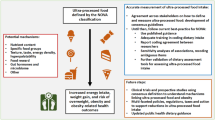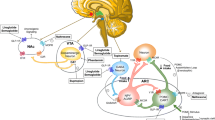Abstract
Our understanding of the relationship between diet and prostate cancer is still developing. Currently, randomized, controlled trials are under way that will yield evidence on which to base recommendations regarding dietary regimens, functional foods, and supplement use. For now, data mostly derive from epidemiologic investigations with limited ability to demonstrate cause and effect, or from benchtop research that may have limited application to in vivo systems, especially in humans. Insufficient evidence currently exists to support the use of specific dietary supplements or functional food. Clinicians striving for best clinical practice should therefore encourage weight management because data consistently show that overweight and obesity are associated with progressive disease and increased overall mortality from prostate cancer and other diseases, especially cardiovascular disease.
Similar content being viewed by others
References and Recommended Reading
Doll R, Peto R: The causes of cancer: quantitative estimates of avoidable risks of cancer in the United States today. J Natl Cancer Inst 1981, 66:1191–1308.
Aggarwal BB, Shishodia S: Molecular targets of dietary agents for prevention and therapy of cancer. Biochem Pharmacol 2006, 71:1397–1421.
Chan JM, Gann PH, Giovannucci EL: Role of diet in prostate cancer development and progression. J Clin Oncol 2005, 23:8152–8160.
Demark-Wahnefried W, Moyad MA: Dietary intervention in the management of prostate cancer. Current Opin Urol 2007, 17:168–174.
Fleshner N, Zlotta AR: Prostate cancer prevention: past, present, and future. Cancer 2007, 110:1889–1899.
Shukla S, Gupta S: Dietary agents in the chemoprevention of prostate cancer. Nutr Cancer 2005, 53:18–32.
Thompson IM, Tangen CM, Klein EA, Lippman SM: Phase III prostate cancer prevention trials: are the costs justified? J Clin Oncol 2005, 23:8161–8164.
Canby-Hagino, Thompson IM: Mechanism of disease: prostate cancer—a model for cancer chemoprevention in clinical practice. Nature Clin Pract Oncol 2005, 2:255–261.
Lamb DJ, Zhang L: Challenges in prostate cancer research: animal models for nutritional studies of chemoprevention and disease progression. J Nutr 2005, 135(12 S):3009S–3015S.
Department of Health and Human Services, US Department of Agriculture: Dietary guidelines for Americans, 2005. Accessible at http://www.health.gov/dietaryguidelines. Accessed on January 2007.
Pryor WA, Stahl W, Rock CL: Beta carotene: from biochemistry to clinical trials. Nutr Rev 2000, 58:39–53.
The Alpha-Tocopherol, Beta-Carotene Cancer Prevention Study Group: The effect of vitamin E and beta-carotene on the incidence of lung cancer and other cancers in male smokers. N Engl J M 1994, 330:1029–1035.
Omenn GS, Goodman GE, Thornquist MD, et al.: Risk factors for lung cancer and the intervention effects in CARET, the beta-carotene and retinol efficacy trial. J Natl Cancer Inst 1996, 88:1550–1559.
Weinstein SJ, Wright ME, Lawson KA, et al.: Serum and dietary vitamin E in relation to prostate cancer risk. Cancer Epidemiol Biomarkers Prev 2007, 16:1253–1259.
Bairati I, Meyer F, Jobin E, et al.: Antioxidant vitamins supplementation and mortality: a randomized trial in head and neck cancer patients. Int J Cancer 2006, 119:2221–2224.
Miller ER III, Pastor-Barriuso R, Dalal D, et al.: Meta-analysis: high-dosage vitamin E supplementation may increase all-cause mortality. Ann Intern Med 2005, 142:37–46.
Potter JD: Food and Cancer Prevention II: summary of the meeting. Cancer Letters 1997, 114:337–338.
Bjelakovic G, Nikolova D, Glund LL, et al.: Mortality in randomized trials of antioxidant supplements for primary and secondary prevention: systematic review and meta-analysis. JAMA 2007, 297, 842–857.
Lawson KA, Wright ME, Subar A, et al.: Multivitamin use and risk of prostate cancer in the National Institutes of Health-AARP Diet and Health Study. J Natl Cancer Inst 2007, 99:754–764.
Food and Nutrition Board/National Academy of Sciences/Institutes of Medicine. Dietary Reference Intakes. Accessible at http://www.iom.edu/Object.File/Master/21/372/0.pdf. Accessed on January 10, 2008.
Reid ME, Stratton MS, Lillico AJ, et al.: A report of high-dose selenium supplementation: response and toxicities. J Trace Elements Med Biol 2004, 18:69–74.
Williams R, Ansford A: Acute selenium toxicity: Australia’s second fatality. Pathol 2007, 39:289–290.
Bemis DL, Capodice JL, Costello JE, et al.: The use of herbal and over-the-counter dietary supplements for the prevention of prostate cancer. Current Oncol Reports 2006, 8:228–236.
Schmid HP, Engeler DS, Pummer K, Schmitz-Drager BJ: Prevention of prostate cancer: more questions than data. Recent Results Cancer Res 2007, 174:101–107.
Ansari MS, Gupta NP: A comparison of lycopene and orchidectomy vs orchidectomy alone in the management of advanced prostate cancer. Br J Urol Int 2003, 92:375–378.
Bunker CH, McDonald AC, Evans RW, et al.: A randomized trial of lycopene supplementation in Tobago men with high prostate cancer risk. Nutr Cancer 2007, 57:130–137.
Kucuk O, Sarkar FH, Sakr W, et al.: Phase II randomized clinical trial of lycopene supplementation before radical prostatectomy. Cancer Epidemiol Biomarkers Prev 2001, 10:861–868.
Hoenjet KM, Dagnelie PC, Delaere KP, et al.: Effect of a nutritional supplement containing vitamin E, selenium, vitamin C and coenzyme Q10 on serum PSA in patients with hormonally untreated carcinoma of the prostate: a randomised placebo-controlled study. Euro Urol 2005, 47:433–439.
Kranse R, Dagnelie PC, van Kemende MC, et al.: Dietary intervention in prostate cancer patients: PSA response in a randomized double-blind placebo-controlled trial. Int J Cancer 2005, 113:835–840.
Schröder FH, Roobol MJ, Boevé ER, et al.: Randomized double blind, placebo-controlled crossover study in men with prostate cancer and rising PSA: effectiveness of a dietary supplement. Euro Urol 2005, 48:922–931.
Hamilton-Reeves JM, Rebello SA, Thomas W, et al.: Isoflavone-rich soy protein isolate suppresses androgen receptor expression without altering estrogen-beta expression or serum hormonal profiles in men at high risk of prostate cancer. J Nutr 2007, 137:1769–1775.
Kumar NB, Cantor A, Allen K, et al.: The specific role of isoflavones in reducing prostate cancer risk. Prostate 2004, 59:141–147.
Dalais FS, Meliala A, Wattanapenpaiboon N, et al.: Effects of a diet rich in phytoestrogens on prostate-specific antigen and sex hormones in men diagnosed with prostate cancer. Urol 2004, 64:510–515.
Bylund A, Lundin E, Zhang JX, et al.: Randomised controlled short-term intervention pilot study on rye bread in prostate cancer. Euro J Cancer Prevent 2003, 12:407–415.
Ornish D, Weidner G, Fair WR, et al.: Intensive lifestyle changes may affect the progression of prostate cancer. J Urol 2005, 174:1065–1070.
Lippman SM, Goodman PJ, Klein EA, et al.: Designing the Selenium and Vitamin E Cancer Prevention Trial (SELECT). J Natl Cancer Inst 2005, 97:94–102.
Marshall JR, Sakr W, Wood D, et al.: Design and progress of a trial of selenium to prevent prostate cancer among men with high-grade prostatic intraepithelial neoplasia. Cancer Epidemiol Biomarkers Prev 2006, 15:1479–1484.
Etminan M, FitzGerald JM, Gleave M, et al.: Intake of selenium in the prevention of prostate cancer: a systematic review and meta-analysis. Cancer Causes Control 2005, 16:1125–1131.
MacInnes RJ, English DR: Body size and composition and prostate cancer risk: systematic review and meta-regression analysis. Cancer Causes Control 2006, 17:989–1003.
Rodriguez C, Freedland SJ, Deka A, et al.: Body mass index, weight change, and risk of prostate cancer in the Cancer Prevention Study II nutrition cohort. Cancer Epidemiol Biomarkers Prev 2007, 16:63–69.
Wright ME, Chang SC, Schatzkin A, et al.: Prospective study of adiposity and weight change in relation to prostate cancer incidence and mortality. Cancer 2007, 109:675–684.
Doyle C, Kushi LH, Byers T, et al.: Nutrition and physical activity during and after cancer treatment: an American Cancer Society guide for informed choices. CA Cancer J Clin 2006, 56:323–353.
World Cancer Research Fund/American Institute for Cancer Research: Second Expert Report, Food, Nutrition, Physical Activity, and the Prevention of Cancer: A Global Perspective. Washington, DC: American Institute for Cancer Research, 2007.
Halabi S, Ou SS, Vogelzang NJ, Small E: Inverse correlation between body mass index and clinical outcomes in men with advanced castration-recurrent prostate cancer. Cancer 2007, 110:1478–1484.
Kalantar-Zadeh K, Horwich TB, Oreopoulos A, et al.: Risk factor paradox in wasting diseases. Curr Opin Clin Nutr Metabol Care 2007, 10:433–442.
Laviano A, Meguid MM, Inui A, et al.: Therapy insight: cancer anorexia-cachexia syndrome—when all you can eat is yourself. Nature Clin Pract Oncol 2005, 2:158–165.
Podgorski I, Linebaugh BE, Sloane BF: Cathepsin K in the bone microenvironment: link between obesity and prostate cancer? Biochem Soc Transactions 2007, 35:701–703.
DeMarzo AM, Platz EA, Sutcliffe S, et al.: Inflammation in prostate carcinogenesis. Nature Rev Cancer 2007, 7:256–269.
Freedland SJ, Platz EA: Obesity and prostate cancer: making sense out of apparently conflicting data. Epidemiol Rev 2007, 29:88–97.
Demark-Wahnefried W, Aziz N, Rowland J, Pinto BM: Riding the crest of the teachable moment: Promoting long-term health after the diagnosis of cancer. J Clin Oncol 2005, 23:5814–5830.
Author information
Authors and Affiliations
Corresponding author
Rights and permissions
About this article
Cite this article
Demark-Wahnefried, W. Dietary interventions in prostate cancer. Curr Urol Rep 9, 217–225 (2008). https://doi.org/10.1007/s11934-008-0038-8
Published:
Issue Date:
DOI: https://doi.org/10.1007/s11934-008-0038-8




